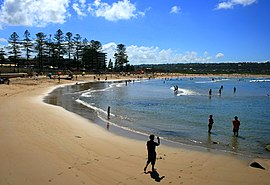Dee Why, New South Wales
|
Dee Why Sydney, New South Wales |
|||||||||||||
|---|---|---|---|---|---|---|---|---|---|---|---|---|---|

Dee Why Beach
|
|||||||||||||
| Population | 19,838 (2011 census) | ||||||||||||
| Postcode(s) | 2099 | ||||||||||||
| Location | 18 km (11 mi) north-east of Sydney CBD | ||||||||||||
| LGA(s) | Northern Beaches Council | ||||||||||||
| State electorate(s) | Manly, Wakehurst | ||||||||||||
| Federal Division(s) | Warringah,Mackellar | ||||||||||||
|
|||||||||||||
Dee Why /diːˈwaɪ/ is a suburb of northern Sydney, in the state of New South Wales, Australia 18 kilometres north-east of the Sydney central business district. It is the administrative centre of the local government area of Northern Beaches Council, and along with Brookvale is considered to be the main centre of the Northern Beaches region.
The reasons for Dee Why's name remain unclear. The earliest reference to it is a pencil note in surveyor James Meehan's field book, "Wednesday, 27th Sept, 1815 Dy Beach - Marked a Honey Suckle Tree near the Beach". What it meant to him is not clear, but various claims have been put forward, including:
From 1840 the name was recorded as one word, 'Deewhy'. The term 'Dee Why' was also used to name 'Dee Why Heights' or Highlands, known as Narraweena since 1951, and 'Dee Why West', the name of which was changed to Cromer in 1969.
Dee Why Post Office opened on 26 April 1915. Dee Why Beach Post Office opened on 1 December 1945 and closed in 1979. Dee Why North Post Office opened on 1 October 1959 and closed in 1993.
Little is known of the Aboriginal people who lived in the Dee Why area before European occupation, although there is evidence of a midden at the southern end of Dee Why Beach, and the indigenous people were known to fish on the then wider and deeper lagoon, where black swans were once seen in large flocks.
The first land in the area to be listed by the New South Wales government Gazette was 700 acres (280 ha) granted to William Cossar in the early 19th century, James Wheeler purchased 90 acres in 1842, but by the mid-19th century most of the land in what is now Dee Why had been acquired by James Jenkins and other members of the Jenkins family. Elizabeth Jenkins, eldest daughter of James, gave all her land to the Salvation Army upon her death in 1900, in recognition of their support in her old age. The Salvation Army received in total 1,740 acres (700 ha) of land, 200 acres (81 ha) of which were in Dee Why. An industrial farm, as well as hostels for boys, girls and women were established on this land. Access to the beach was limited by the Salvation Army's land, with a wire netting barrier running along its length.
...
Wikipedia
